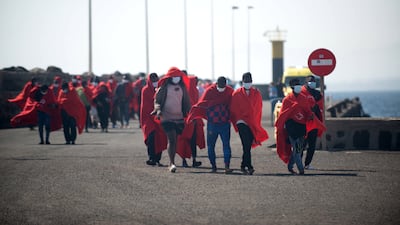A boy has been found dead onboard a migrant boat spotted drifting in the Atlantic Ocean, the Canary Islands emergency service said.
Two adults and five other children on the same boat were suffering from hypothermia and dehydration and flown by helicopter for urgent medical treatment.
Rescuers found the body of the boy aged about 5 on the seven-metre-long boat with 23 women and five children – two babies, two 6 year olds and a 7 year old, a coastguard spokesman said.
About 50 more people were brought to shore by a Spanish Maritime Rescue Service vessel, which docked in the port of Arguineguin.
The stricken boat was spotted, drifting in the Atlantic about 185 kilometres south-west of Gran Canaria, by a Maritime Rescue Service plane.
Red Cross official Jose Antonio Rodriguez said the rescued migrants left Dakhla, in the Western Sahara, eight days ago.
Migrant arrivals in the Canary Islands, a Spanish archipelago nearer Africa than continental Europe, have been rising. As Spanish territory, it is inside the European Union.
At least 14,720 people have made the dangerous trip this year, an 83 per cent increase compared to the same period last year, Spain’s Interior Ministry said.
While many boats reach the islands, migration experts say others disappear in the Atlantic without trace in what are known as invisible shipwrecks.
About 900 people have this year died or gone missing in trying to reach the Canary Islands by boat but that could be a significant underestimation, the United Nations’ migration agency said.
The Spanish migrant rights group, Walking Borders, said it counted about 2,000 deaths on the Atlantic route in the first six months of this year.
Conflict, poverty and factors exacerbated by Covid-19 and climate change have led desperate, Europe-bound travellers to board unsafe boats along the West African coast from Morocco all the way south to The Gambia.
Increasing border controls and interceptions in the Mediterranean Sea between North Africa and southern Europe have led people smugglers to adapt by launching more boats on the Atlantic.


